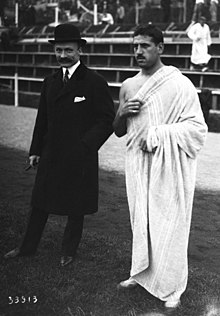Marie Charles Jean Melchior, Marquis de Polignac
Marie Charles Jean Melchior, Marquis de Polignac (born September 27, 1880 in Joigny , † December 18, 1950 in Neuilly-sur-Seine ) was a French businessman. He was a member of the Executive Committee of the International Olympic Committee , promoted French top-class sport and set up the first national center of French top-class sport.
Life
De Polignac came from one of the oldest noble families in France. He attended Stella Matutina -School in Feldkirch (Austria), the Jesuit college in Paris and went to study at the elite university HEC Montréal (HEC) with 22 years of heritage of the Pommery champagne -Imperiums on, took over 27 years Management and retired in 1945 at the age of 65. He was an excellent musician and was preparing for a career as a soloist; however, he chose to inherit the family. In 1910 he founded the Philharmonic in Reims and was responsible for their regular concerts. He had a large park built in Reims by the landscape architect Édouard Redont for his employees, who otherwise only work in the underground wine cellars. During the First World War he was initially an officer in the infantry before he worked on building the air force. In 1916 he was transferred to the French Embassy in Washington and worked on the side of the Allies after the Americans entered the war. After the war he was the coordinator of the reconstruction of the largely destroyed Reims. During the Second World War he collaborated with the German occupation and was one of the most prominent collaborators (member of the honorary committee of the Groupe Collaboration). He worked closely with the German SD and the Gestapo and made sure that the German occupation officers always had enough champagne and paid for it. At the end of the war he resigned from the management of the company and left it to his politically unencumbered brother, Comte Charles de Polignac.
Career as a sports official
He was a versatile athlete and a dedicated polo player . In 1902 he took part in the Nordic Games in Stockholm and learned a. a. Know Sigfrid Edström . In 1909 he organized the first international air show in Bétheny . In 1913 he built the Collège d'Athlètes, the first sports school for top-class sport in the world, under the direction of Georges Hébert, in his park in Reims . He was so disappointed with France's results at the 1912 Olympic Games that he personally took responsibility for improving performance. He was a sponsor of the last IOC congress in 1914 before the First World War in Paris. The participants then visited the Collège d'Athlètes and were enthusiastic about the sponsorship of top-class sports. In 1913 he became a member of the International Olympic Committee , in 1921 he was elected to the first executive committee of the IOC, to which he belonged, regularly re-elected, until 1950. In 1925 he ran to succeed Pierre de Coubertin as President of the IOC, but was not elected because he had not succeeded in preventing the Organizing Committee of the 1924 Olympic Games from excluding Germany from the Games. However, Baillet-Latour , the new president of the IOC, made him its vice-president, which preserved the unity of the Olympic Movement . De Polignac campaigned for the Winter Olympic Games and ensured that the winter sports week in Chamonix was subsequently recognized as the 1st Winter Olympic Games . Thanks to his good connections with the Swede Edström (first incumbent, then elected President of the IOC since 1942), compromises acceptable to all sides could be found. Although the British government's participation in the 1948 Olympic Games in London declared undesirable, he took part in the games, as the new IOC President Edström held him in all honor.
Honors
- 1909 Knight of the Legion of Honor
- 1929 Officer of the Legion of Honor
- Knight of the Order of Malta
- Commander of the Order of Orange-Nassau
- Officer of the Crown of Belgium
- Knight of the Order of the White Lion of the Czechoslovak Republic
- Olympic Order of Germany (?)
- Olympic Order of Belgium (?)
Web links
Individual evidence
- ↑ Melchior de POLIGNAC (1880-1950) ( Memento of December 24, 2014 in the Internet Archive )
- ^ PP Lambert, G. Le Marec: Partis et mouvement de la Collaboration. Paris: Le Grancher 1993
- ↑ Arnd Krüger : Forgotten Decisions: The IOC on the Eve of World War I. (PDF file) Olympika: The International Journal of Olympic Studies 6 (1997), pp. 85-98
- ^ Ian Buchanan & Wolf Lyberg: The Biographies of All IOC Members. Part V. Journal of Olympic History 18 (2010), 2, 56-65
- ^ Jean-Yves Guillain: Paris 1924. Journal of Olympic History 14 (2006), 1, 22-23
- ↑ Arnd Krüger : Germany and the Olympic Movement (1918-1945), in: Horst Ueberhorst (Hrsg.): Geschichte der Leibesübungen , Vol. 3/2, Berlin: Bartels & Wernitz, 1982, 1026-1047.
| personal data | |
|---|---|
| SURNAME | Polignac, Marie Charles Jean Melchior Marquis de |
| ALTERNATIVE NAMES | Polignac, Marie Charles Jean Melchior, Marquis de (full name) |
| BRIEF DESCRIPTION | french businessman |
| DATE OF BIRTH | September 27, 1880 |
| PLACE OF BIRTH | Joigny, France |
| DATE OF DEATH | December 18, 1950 |
| Place of death | Neuilly-sur-Seine |
